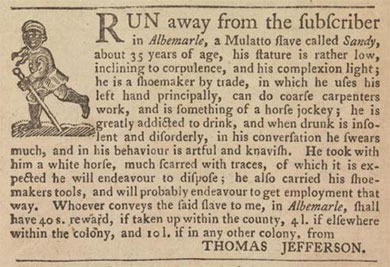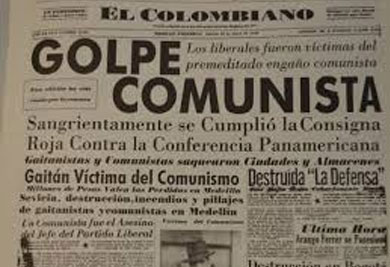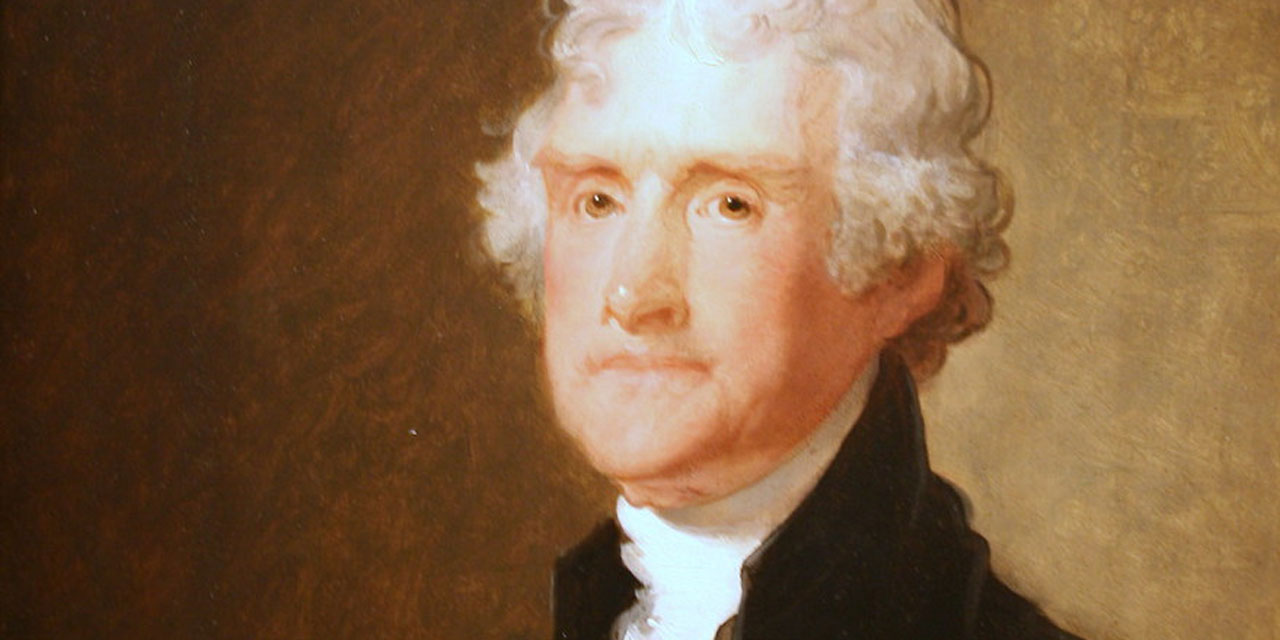The military doctrine a Medellin court dubbed the “origin of evil” in Colombia contains the concept of “the internal enemy,” which originally referred to American slaves.
The National Security Doctrine didn’t exist until 1947 and wasn’t introduced in Colombia until 1962.
The concept of the internal enemy, however, dates back as far as 1814 when Thomas Jefferson expressed his concern about the perceived threat of the British Empire igniting a slave revolt during the War of 1812.
Yet the hour of emancipation is advancing, in the march of time. It will come; and whether brought on by the generous energy of our own minds; or by the bloody process of St. Domingo, excited and conducted by the power of our present enemy, if once stationed permanently within our Country, and offering asylum and arms to the oppressed, is a leaf of our history not left turned over.
Thomas Jefferson
 “The association of the enemy with emancipation reinforced white Virginians’ perception that the defense of slavery was fundamental to a worthwhile American union,” which laid the foundation of the American Civil War, according to US history professor Carter Bruns.
“The association of the enemy with emancipation reinforced white Virginians’ perception that the defense of slavery was fundamental to a worthwhile American union,” which laid the foundation of the American Civil War, according to US history professor Carter Bruns.
This association may also have led to the violent repression of the Civil Rights movement in America in the 1960’s.
How a US military doctrine became Colombia’s ‘origin of evil’ | Part 1: “Popeye”
From slaves to communists
In Colombia, the US military introduced the “internal enemy” concept as part of the National Security Doctrine in 1962 and promoted the violent crackdown of opposition to the authoritarian National Front.
One of the military attacks that sought to do this led to the formation of the FARC guerrilla group in 1964.
Jefferson’s concern of the British achieving victory through the armed support of enslaved African Americans was similar to John F. Kennedy’s concern of the Soviet Union winning the Cold War by “offering asylum and arms to the oppressed” in the Americas, especially after the Cuban Revolution of 1958.
 Moscow was never interested in South America, but Colombia’s governments had been more than interested in exploiting the “Red Scare” for their own benefit as early as 1948.
Moscow was never interested in South America, but Colombia’s governments had been more than interested in exploiting the “Red Scare” for their own benefit as early as 1948.
When the murder of Liberal Party leader Jorge Eliecer Gaitan in April that year ignited extreme violence between liberals and conservatives, US Department of State George Marshall believed the conspiracy theory of his Colombian counterpart, Laureano Gomez, that the revolt was a communist coup.
Marshall and other delegates to the Inter-American Conference have now likewise accused Soviet Russia, and its tool, international communism, of instigating the riots that wrecked Bogota and cast a pall over the whole Western Hemisphere.
New York Times
The CIA’s first director, Admiral Hillenkoetter, almost lost his job and President Harry Truman almost lost the 1948 elections because of Gomez’s lie, who started a trend that continues until this day.
How a US military doctrine became Colombia’s ‘origin of evil’ | Part 2: Special warfare
From communists to young people
President Ivan Duque’s claims that Venezuela was infiltrating anti-government protests in November last year, for example, was also entirely fabricated, and recreated the concept of an external enemy, Venezuela, that allegedly sought to overthrow his government by infiltrating the protests, making the participants the internal enemy.
While the protesters had no intention of overthrowing the government, Duque closed the Venezuelan border, went into siege mode and violently cracked down on the protests.
Dozens of Venezuelan migrants were deported on trumped up charges they had instigated vandalism during the largely peaceful protests.
Like his legendary predecessor, US Secretary of State Mike Pompeo believed the Bogota hoax and expressed his support for Duque’s violent crackdown of peaceful protests.
We in the Trump administration will continue to support countries trying to prevent Cuba and Venezuela from hijacking those protests and we’ll work with legitimate (governments) to prevent protests from morphing into riots and violence that don’t reflect the democratic will of the people.
US Secretary of State Mike Pompeo
Colombia’s Supreme Court knew better and ordered Defense Minister Carlos Holmes Trujillo last week to apologize for the police brutality and guarantee citizens’ right to protest.
A nation that seeks to recover and build its democratic identity cannot describe the citizenry that legitimately protests using the rhetoric of friend and foe, left and right, good and bad, friends of peace and enemies of peace, but as the political expression that seeks to open space for dialogue, consensus and the non-violent reconstruction of the Constitutional State of Law.
Supreme Court
Furthermore, the court ruled the government may no longer stigmatize protesters, or associate peaceful protests with the hostile activity of a military threat.
From the National Security Doctrine to the Damasco Doctrine
The military introduced the new Damasco Doctrine earlier this year to explicitly do away with the concept of the “internal enemy” that had justified the killing of any government critic a military target since the introduction of the National Security Doctrine in the 1960’s.
Doctrinal reform should not aim solely at the counterinsurgency war, since this has been the raw material for the majority of international sentences against Colombia and numerous reports by non-governmental organizations that point out that it is precisely the doctrine – based on the internal enemy, anti-communism, and the National Security Doctrine in the context of the Cold War – that is the framework through which the Colombian Armed Forces, especially the Army, allegedly committed the greatest crimes against humanity on the continent.
Colonel Pedro Javier Guevara
The administration of far-right President Ivan Duque, however, continues to use the “internal enemy” concept to violently repress opposition, Bogota social leader Henry Gomez told student newspaper 070 on Monday.
According to Gomez, the government is “resorting to that same ghost that we saw during the time of [former President] Alvaro Uribe: an internal enemy,” which laid the foundation for the American Civil War in the early 19th Century and is threatening Colombia’s peace process today, according to Gomez.
One of the points of the agreement was to be able to engage in political opposition without fear of being threatened, disappeared, raped or killed, but that is not what we are seeing.
Bogota social leader Henry Gomez
According to the student newspaper, social leaders throughout Bogota have been receiving death threats from the “Aguilas Negras” after renewed protests earlier this month.



